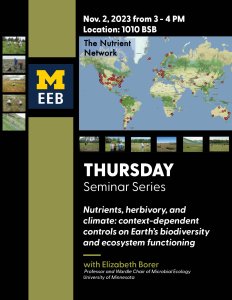Presented By: Ecology and Evolutionary Biology
EEB Thursday Seminar Series - Nutrients, herbivory, and climate: context-dependent controls on Earth’s biodiversity and ecosystem functioning
Elizabeth Borer, Professor and Wardle Chair of Microbial Ecology, University of Minnesota

This event is a part of our ongoing Thursday seminar series.
About: Among the greatest current challenges for ecological research is developing a predictive understanding of links between biodiversity and ecosystem function, on one hand, and ongoing, global-scale changes to nutrient cycles, climate, and species distributions, on the other. Yet, without strong scientific data that informs the conditions under which global changes will alter biodiversity to cause cascading impacts on ecosystem functioning, planning for conservation, restoration, and management will be ineffective. While these research challenges are global in scale, experiments and sampling to measure changes in the composition and function of ecological communities must be done at local scales. In the past 15 years, distributed experiments have emerged as a powerful tool to address these challenges. I will discuss my experience with conceiving and implementing a globally distributed, collaborative network of identically replicated grassland experiments, the Nutrient Network, that is generating unique data on the condition-dependence of biotic responses to global change. In my talk, I will present some of the network’s insights into the interactions among ongoing global changes to Earth’s ecosystems, including nitrogen influx and climate, that control biodiversity and ecosystem processes in the world’s grassland ecosystems.
Website: https://z.umn.edu/borer-lab
About: Among the greatest current challenges for ecological research is developing a predictive understanding of links between biodiversity and ecosystem function, on one hand, and ongoing, global-scale changes to nutrient cycles, climate, and species distributions, on the other. Yet, without strong scientific data that informs the conditions under which global changes will alter biodiversity to cause cascading impacts on ecosystem functioning, planning for conservation, restoration, and management will be ineffective. While these research challenges are global in scale, experiments and sampling to measure changes in the composition and function of ecological communities must be done at local scales. In the past 15 years, distributed experiments have emerged as a powerful tool to address these challenges. I will discuss my experience with conceiving and implementing a globally distributed, collaborative network of identically replicated grassland experiments, the Nutrient Network, that is generating unique data on the condition-dependence of biotic responses to global change. In my talk, I will present some of the network’s insights into the interactions among ongoing global changes to Earth’s ecosystems, including nitrogen influx and climate, that control biodiversity and ecosystem processes in the world’s grassland ecosystems.
Website: https://z.umn.edu/borer-lab